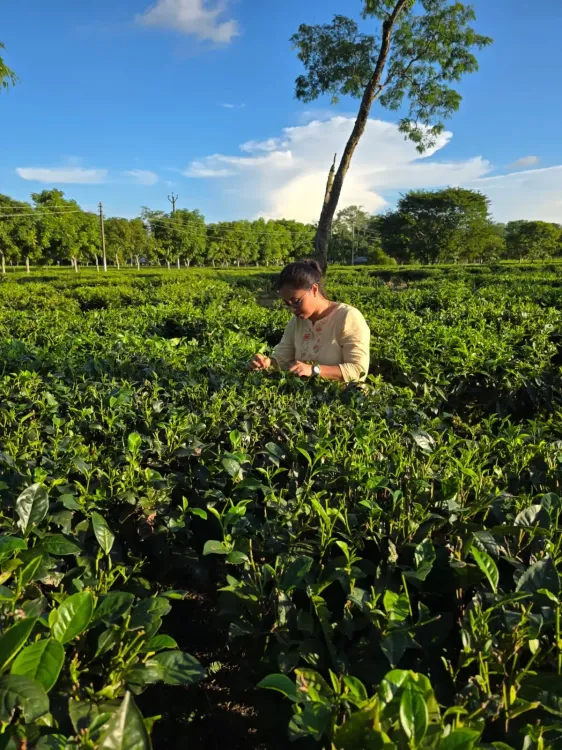What is the Tea Blossoms’ Potential for Wellness Products and Rural Growth?

Synopsis
Key Takeaways
- Nagaland University leads innovative research on tea blossoms.
- Tea blossoms are rich in bioactive compounds.
- New income opportunities for smallholder farmers.
- Potential for developing health supplements and wellness products.
- Promotes environmental sustainability by reducing waste.
Kohima, Oct 13 (NationPress) A multi-institutional study spearheaded by Nagaland University has revealed the remarkable health benefits of tea blossoms, often treated as waste byproducts in agriculture, according to officials on Monday.
An official from the university stated that the research indicates these fragile flowers contain a wealth of powerful bioactive compounds, making them a potential source for health supplements and functional beverages.
While tea leaves have long been the focus of global research and consumption, blossoms have remained relatively neglected, the official noted.
This research marks the first systematic exploration in Assam, a region renowned for its tea production, aimed at assessing the biochemical properties of tea blossoms from seven premium varieties, shifting away from the traditional emphasis on leaves.
Nutraceutical companies have the opportunity to utilize tea blossom extracts to develop natural energy enhancers, relaxation products, and skincare solutions.
In addition to health benefits, the study presents economic prospects for small-scale tea farmers by generating new income avenues through blossom harvesting and processing.
According to the findings, this method promotes environmental sustainability by minimizing agricultural waste and contributing to a circular bio-economy.
With the increasing global demand for plant-based and eco-friendly health products, India has the potential to emerge as a frontrunner in the market for functional foods and supplements derived from tea blossoms, the report stated.
Dr. Sagarika Das, a researcher at the Centre for Biotechnology and Bioinformatics at Dibrugarh University, led this pioneering study in collaboration with noted tea biochemist Monoranjan Goswami from Tocklai Tea Research Institute in Jorhat, Assam, and Prof. Tanmoy Karak from the Department of Soil Science at the School of Agricultural Sciences, Nagaland University.
This groundbreaking research also received contributions from esteemed institutions, including the University of California, the ICAR-Indian Agricultural Statistics Research Institute in New Delhi, and several departments from Nagaland University and Dibrugarh University, showcasing an extraordinary collaboration aimed at scientific excellence.
The results of this research have been published in a reputable peer-reviewed journal.
Emphasizing Nagaland University’s commitment to translational research benefiting local communities, Vice Chancellor Prof. Jagadish K. Patnaik stated, "This innovative research highlights the potential for regional innovations to create significant global impacts. By harnessing the often-overlooked advantages of tea blossoms, our dedicated scientists are driving advancements in health and wellness, potentially revolutionizing dietary supplements and natural remedies."
This initiative not only expands the boundaries of scientific research but also creates opportunities for rural entrepreneurship, empowering local communities to adopt sustainable agricultural practices and generate new economic prospects, he added.
Nagaland University takes pride in collaborating with prestigious research organizations, both domestically and internationally, to further this transformative work, according to the VC.
"Our collaborative efforts aim to deepen scientific understanding while addressing urgent societal issues. Together, we are not only advancing scientific fields but also building a more resilient and sustainable future for our communities and beyond," he stated.
The research team intends to progress into clinical trials, investigate synergies with other nutraceuticals, and scale up for industrial applications in the food, pharmaceutical, and wellness industries.
Dr. Das elaborated that tea blossoms are rich in health-boosting compounds, exhibiting notably higher levels of polyphenols, catechins, terpenoids, and L-theanine, while containing less caffeine compared to standard tea leaves.
The presence of L-theanine, especially when combined with caffeine, supports mental clarity, relaxation, and stress reduction, she noted.
"By repurposing tea blossoms, we can minimize agricultural waste, boost rural incomes, and diversify the tea sector through the creation of nutraceuticals, herbal teas, and dietary supplements," she added.
Further, Prof. Karak emphasized that the study reveals the versatility of tea blossoms as ingredients that can be transformed into various products, including herbal teas, infused oils, dietary supplements, and unique wellness formulations.
Rich in antioxidants and essential amino acids, tea blossoms hold significant promise as effective solutions for stress relief, cognitive enhancement, and the prevention of chronic diseases like diabetes and cardiovascular issues, he indicated.
"Our research shows that tea blossoms should not merely be viewed as byproducts of tea cultivation; instead, they represent valuable nutraceutical resources with considerable commercial potential. With additional clinical validation to confirm their health benefits, tea blossoms could play a vital role in promoting overall wellness. Furthermore, developing products derived from tea blossoms could stimulate economic growth in rural regions where tea is cultivated, supporting local farmers and creating job opportunities," Prof. Karak pointed out.
He concluded that this innovation positions India to enhance its global leadership in plant-based health products, showcasing the country’s rich biodiversity and dedication to sustainable health solutions.









